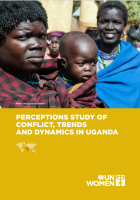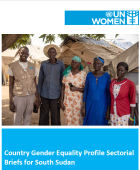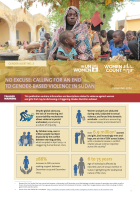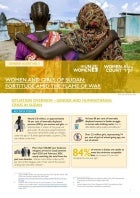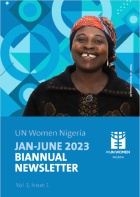1 - 20 of 64 Results
Pagination
Date:
Since independence in 1962, Uganda has faced ongoing conflicts, marked by violence and gender-based violations. The government supports the Women, Peace, and Security (WPS) Agenda, rooted in UNSCR 1325, emphasizing women’s participation in peacebuilding and conflict resolution. Through National Action Plans, Uganda seeks to protect women’s rights, address post-conflict needs, and promote sustainable peace, though challenges persist in rehabilitation and reconstruction efforts.
Date:
While progress has been made in gender equality policies and peacebuilding, women face structural barriers. The study recommends strengthening legal frameworks, institutional structures, and socio-economic initiatives, urging collaboration among government, UN agencies, civil society, and partners to advance gender equality and women’s empowerment.
Date:
More than 11 million people have been displaced amid the conflict in Sudan as of October 2024, with more than half (54 per cent) being women and girls. An estimated 12 million people are currently at risk of gender-based violence, as described in this new Gender Alert by UN Women.
Date:
Generation Equality is a global initiative that aims to drive change through a multigenerational and multi-stakeholder approach, focusing on key issues like equal pay, fair distribution of unpaid care work, eradicating gender-based violence, healthcare access, and increasing women’s political participation.
Date:
The UN Women Kenya Annual Report highlights key achievements in advancing women’s empowerment and gender equality.
This report showcases progress in increasing women’s leadership and political participation, strengthening economic empowerment, eliminating violence against women and girls, engaging women in peace and security efforts, and enhancing planning and coordination.
UN Women Kenya remains dedicated to building a future where women are at the heart of developing resilient and sustainable communities.
Date:
This analysis aims to gain insights into the unique challenges, needs, and priorities of women, girls, men, and boys. It seeks to guide humanitarian, development, and peace actors in tailoring their responses to effectively meet the diverse needs of returnees, refugees, displaced populations, and host communities.
Date:
This analysis aimed to assess the impact of the conflict in the Greater Pibor Administrative Area (GPAA), including key protection risks and needs, and to identify triggers of the conflict.
Date:
This publication provides a detailed analysis of the ongoing humanitarian crisis in Sudan, focusing on its disproportionate impact on women and girls. As the country faces the largest internal displacement since the Syrian civil war, millions of Sudanese, particularly women and children, are grappling with severe challenges.
Date:
This study focuses on the gendered review of the participation of women in the peace processes, and examines peace agreements signed in Uganda, Sudan, South Sudan, and Ethiopia.
Date:
The ultimate goal is that women and girls in Sudan benefit from gender-responsive humanitarian action and targeted assistance that responds to their basic needs, and from opportunities for their meaningful participation in peace, political and humanitarian processes.
Date:
This report highlights some encouraging advancements. The information presented in this report is based on the latest available data (as of June 2024) on selected indicators in the global indicator framework for the Sustainable Development Goals.
Date:
This manual has been designed for women leaders within grassroots networks throughout Somalia and in the federal member states. It will support women leaders’ capacity to engage with the Transformative Leadership for Women’s Rights principles, empowerment, peace and participation.
Date:
This report seeks to promote the inclusion of women in leadership roles within the peacebuilding process, realize women’s potential as peacebuilders to contribute to reconciliation, conflict prevention, and develop stronger infrastructures for peacebuilding in Somalia.
Date:
This brief emerges from the Country Gender Equality Profile (CGEP), which captures the country’s gender equality and women empowerment (GEWE) situation across Kenya’s diverse areas and contexts.
Date:
The newsletter highlights efforts in Nigeria to promote gender equality and women's empowerment, emphasizing advocacy during the 2023 General Elections. It features initiatives such as assessing UN Women's Strategic Note, launching a strategic framework for development partners, and showcasing technological innovations by young Nigerians. Economic empowerment through affirmative procurement and human-interest stories are also included, as well as partners' contributions.
Date:
The publication comprehensively analyzes the country’s gender equality and women empowerment (GEWE) situation across Kenya’s diverse areas and contexts.
Date:
This brief emerges from Regional Gender Assessment of the Impact of Sudan Conflict on Women and Girls in Sudan and its Neighboring Countries. It provides the findings and recommendations of the regional gender analysis of the Sudan conflict, which UN Women conducted between July and August 2023.
Date:
This brief emerges from the Assessment of National Responses and Strategies on Trafficking in Persons and Migration, with a specific focus on the vulnerabilities of women and girls to all forms of exploitation.
Date:
This publication analyses and provides the state of policy, legal, and institutional frameworks for promoting the rights, opportunities, and welfare of men and women in the country.
Date:
This publication aims to accelerate the implementation of the Women Peace and Security commitments across the IGAD region.

